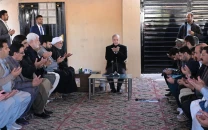Book launch: PNA movement triggered media’s right-wing stance
Religious elements of the organisation have contributed to the present-day right-wing discourse.

The book, written by Dr Noor Fatima and titled “Press and Political Role of Print Media During PNA Movement Against Bhutto,” was launched at the Society for Alternative Media and Research (SAMAR) office premises. PHOTO: FILE
The religious brand of the 1977 Pakistan National Alliance (PNA) movement has had a lasting impression on discourse in Pakistan, particularly on the stance adopted by the media.
These were the views expressed by speakers during a book launch on Thursday, organised by the Islamabad Cultural Forum.
The book, written by Dr Noor Fatima and titled “Press and Political Role of Print Media During PNA Movement Against Bhutto,” was launched at the Society for Alternative Media and Research (SAMAR) office premises.
It is based on academic research conducted in 1987-88 by Dr Fatima, who is currently chairperson of the Department of Politics and International Relations at the Islamic International University Islamabad.
She has done a content analysis of the editorials and lead stories from four newspapers over the duration of the PNA movement.
PNA — an alliance of nine ideologically diverse political parties — was formed immediately after Zulfikar Ali Bhutto announced early elections in 1977. When Bhutto’s Pakistan Peoples Party won a majority in parliament, the alliance launched a movement to protest against alleged poll rigging.
With enforcement of Islamic laws as its primary slogan, the PNA movement gained momentum and found support among religious circles and the business community.
The Bhutto government had almost reached an agreement with the PNA when the military staged a coup in July 1977 which dislodged Bhutto and enforced martial law in the country.
Fatima said she found out that Nawa-i Waqt had supported the PNA movement while Jang had waited to take an editorial position until Bhutto’s situation had weakened. Dawn showed impartiality in coverage and the government-owned Pakistan Times mostly resorted to state narrative, she added.
Fatima said the print media at times played the role of legitimising and systemising chaos during the movement.
However, she said the English dailies, Dawn and Pakistan Times often diffused tensions when the movement was at its peak.
Fatima said she wanted the book to act as a content analysis tutorial for media students.
Director Jinnah Institute Raza Rumi said cross-media ownership in Pakistan turned media owners into a collective power-hungry “criminal oligarchy”.
He said religious elements of the PNA were able to penetrate the education and information sectors after martial law was imposed in 1977, resulting in a tilt towards the present-day right-wing discourse in the country.
SAMAR Executive Director Mazhar Arif said the media were still spreading chaos in society just as they were 1977.
However, veteran journalist Nasir Zaidi contended that the print media, particularly the four newspapers selected for Fatima’s study, did not have such a significant impact on the PNA movement.
Zaidi said the movement’s populism was credited to hearsay and the British Broadcasting (BBC) radio programmes. The Express Tribune Executive Editor M Ziauddin, who presided over the ceremony, agreed with Zaidi’s assessment.
“It seems like the media did not make any difference to the PNA movement,” he said.
Ziauddin said state media had greater reach than BBC radio, indicating that the movement might have been supported by the establishment, not unlike military support lent to the Islami Jamhoori Ittehad in the 1990s.
Published in The Express Tribune, April 12th, 2013.



















COMMENTS
Comments are moderated and generally will be posted if they are on-topic and not abusive.
For more information, please see our Comments FAQ